This year’s Power Players

1. Sam Clarke, chief vehicle officer, GRIDSERVE
Sam Clarke, the founder of Gnewt Cargo and now at GRIDSERVE, is said to be “tackling the perennial chicken and egg conundrum of which comes first, vehicles or charging infrastructure”.
The judges said: “Sam Clarke has been very prominent across the board. He is vocal, influential and passionate about decarbonising road transport and is leading one of the government’s four flagship Zero Emission HGV and Infrastructure Demonstrator (ZEHID) programmes, Electric Freightway.”
Read a full interview with Sam Clarke on the Green Heroes page.
2. Chris Welch, MD, Welch’s Transport
Chris Welch has been leading the decarbonisation chargefor the SME sector, ensuring Cambridge-based Welch’sTransport is positioned at the centre of new technologyand sustainability initiatives. Last year he led the business to launch a net-zero delivery service in Cambridgeshire, using a Renault Trucks E-Tech D Wide 4x2 curtainsiderrigid, the first fully electric HGV on its fleet.
Welch also launched an urban consolidation centre, which aims tomake last-mile deliveries in the city of Cambridge emission-free andcut vehicle trips by 46%. In addition, the company has rolled outOptimize routing technology across its 80-strong fleet to further reduceemissions.
The business is a participant in the eFREIGHT 2030 consortium, led by Voltempo, which forms part of the wider Zero Emission HGVand Infrastructure Demonstrator programme.The project has been awarded £49.2m of government funding and will demonstrate how battery-electric HGVs can replace conventionalHGVs at scale, using British technology.
It is also expected to unlock an expected £500m of private investmentfrom consortium members in electric vehicles and charging hubsacross the UK by 2030.Welch’s Transport is one of only a very few SMEs involved in theprogramme.
The judges said: “Chris is very prominent in the decarbonisation space and will prove influential when it comes to theSME market. He is enthusiastic and out there, knowledge-sharing and encouraging others to follow suit.”
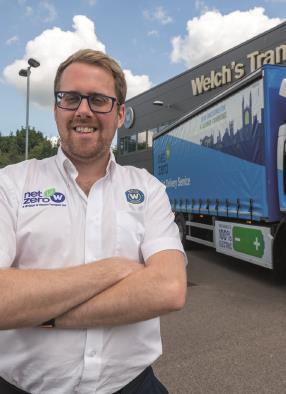
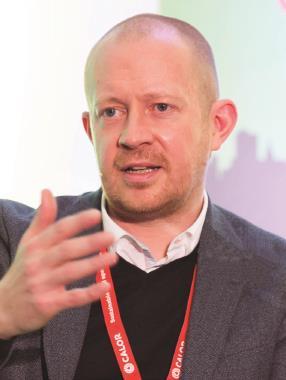
3. Bob Moran, deputy director of decarbonisation strategy, DfT
With a strong professional vehicle engineering background, Bob Moran has the ideal credentials to ensure the DfT’s decarbonisation strategy supports the government’s wider net-zero ambition and also works for operators on the front line of industry.
His varied 20-year career at the DfT has seen Moran first focus on safety and road worthiness through to pioneering work at the Office for Low Emission Vehicles – a cross-government policy unit working to position the UK as a global leader in the design, development, manufacture and deployment of zero-emission vehicles and associated technologies.
His most recent work involves helping to shape and deliver the government’s Transport Decarbonisation Plan, launched in 2021, which included a consultation with industry on the phase-out date for diesel HGVs. He has also led the development of the £200m government-funded Zero-Emission HGV and Infrastructure Demonstrator scheme and is willing to engage openly with industry in public forums, not shying away from challenging questions.
The judges said: “Bob is responsible for driving forward major decarbonisation strategy decisions and projects for the government. He is always very positive with his level of engagement with industry and often takes part in key events to connect with the road transport sector. He is also very active in promoting the agenda and driving it forward. He has a genuine interest and asks lots of questions and has been looking to devise a strategy that recognises the challenge.”
4. Carlos Rodrigues,MD, Renault Trucks UK
Carlos Rodrigues has played a pivotal role in the company’s commitment to decarbonisation. He’s a new entry into the Power Players and is the first truck company senior leader to feature in the list. His inclusion is an acknowledgement by the jury of the important role truck manufacturers are playing in driving the shift to low- and zero-carbon vehicles.
Renault Trucks has made significant strides in this area, aligning with global efforts to reduce CO2 emissions, and Rodrigues has been fearless in his championing of commercial vehicle decarbonisation. As well as creating an organisation within Renault Trucks, which is uniquely equipped and qualified to help operators prepare for the transition, he has invested in major initiatives that help operators make that transition. For instance, under his stewardship Renault Trucks has provided the EV Discovery demonstration vehicles offered by Vertellus, and will provide vehicles to two of the ZEHID consortia, Electric Freightway and eFREIGHT 2030.
Similarly, Rodrigues and the Renault Trucks dealer network have prioritised technician training and by the end of 2023, nearly 50% of the service network were fully qualified to support EVs and energy transition specialists will guide customers through their transition to EVs, addressing technical aspects and ensuring its smooth adoption.
The judges said: “The Renault Trucks portfolio is hitting the roads right now and helping the industry to decarbonise sooner. Through its partnership with Vertellus, it is also providing an interesting try-before-you-buy option for operators to help them get started with their own decarbonisation journeys.”
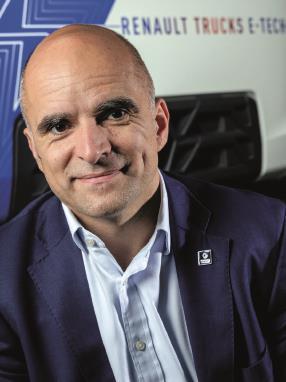

5. Dr Nicholas Head, environmental and sustainability lead, XPO Logistics
Dr Nicholas Head is the environmental and sustainability lead for XPO Logistics UK and Ireland. Since joining XPO Logistics in 2021, Head has led the company’s sustainability strategy and is the driving force for the organisation to decarbonise its commercial vehicle fleet by 2035 and be fully carbon-neutral by 2040.
Head has a wealth of knowledge on decarbonisation and is passionate about ESG, supporting XPO’s customers and operational teams. Leading XPO’s involvement in the ZEHID trials, Head is putting 20 EVs on the road this year. He has specialised in the environmental sector over the past 13 years, including achieving an MSc and PhD from the University of Northampton, focusing on circular economy and assessing the viability of business models structured around sustainability. During his PhD studies, Head lectured on his specialisms of circular economy and systems-thinking approaches to environmental issues at the University of Northampton and the Open University before moving back into the private sector as a consultant and then for various FMCG companies as head of sustainability positions over the past four years.
A member of the CIWM, Head has sat on and contributed to various steering groups over the past five years and has also been an active member of the Schumacher Institute (looking at societal issues from systems thinking perspective), IEMA and the sustainability committee for the British Coffee Association.
The judges said: “XPO has done some fantastic work around transitioning to a more sustainable HGV fleet with the use of renewable gas. Head has a lot of influence due to the scale of the fleet and has a very high impact.”
6. Michael Boxwell, CEO, Voltempo
A serial entrepreneur, Michael Boxwell has worked in technology development for more than 30 years, specialising in EV, charging systems and renewable energy products for the past 20. As group CEO of Voltempo, developers of the Britishdesigned and manufactured e-HGV megawatt HyperCharging system, Boxwell is accelerating the uptake of e-HGVs and delivering the next generation EV chargers. He works closely with government agencies and significant stakeholders to fast-track EV innovation, infrastructure, and technology. He has been pivotal in Voltempo leading the eFREIGHT 2030 consortium, one of the ZEHID programmes.

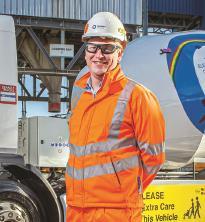
7. Ben Garner, senior manager logistics development, Tarmac
Ben Garner is a huge champion of decarbonisation with the influential reach of one of the largest construction companies. His role is to bring new technology and innovation into the business, with a 2,500-strong fleet. He has collaborated with Renault Trucks and TVS Interfleet McPhee Mixers to develop the UK’s first e-mixer truck, with an ambition to introduce zero-emission vehicles across all Tarmac’s urban sites. As the company also generates all of its site power from renewable sources, the e-mixer can be a carbon-neutral solution. Garner has also led trials into low-carbon fuels, such as HVO, across the fleet. Tarmac has taken the EV100 pledge and introduced AI-enhanced concrete sensors to boost sustainable construction.
8. Nicholas Beatty, founder, Zenobè
Nicholas Beatty is one of the co-founders of Zenobè, a fleet electrification and battery storage specialist. Beatty and Zenobè have developed charging infrastructure solutions designed around the needs of large fleets. Using battery storage and renewable energy sources, supply can be augmented at sites where peak energy demand exceeds grid supply. By using second-use batteries (when available), Zenobè is supporting a circular economy for EV batteries and the industry. Building on its expertise in the bus sector in particular, Zenobè has a strong record of electrifying fleets and has used this to develop a compelling solution for truck fleets. The business is a partner in the EV Discovery programme offered by Vertellus, where a temporary charger is provided alongside the Renault Trucks E-Tech model, allowing operators to try before they buy.


9. Tom Parker, head of EU on road, Amazon
Tom Parker oversees the development and implementation of sustainable transport strategies for the company’s logistics operations in Europe, particularly around last-mile deliveries. He has more than eight years’ experience in transportation planning and policy, working for various public- and private-sector organisations. Amazon has launched micromobility hubs in more than 20 cities across Europe, including London, and expects to double that figure by the end of 2025. In Europe’s traditionally dense cities, these hubs enable Amazon to operate new delivery methods, such as e-cargo bikes and on-foot deliveries, to bring packages to customers more sustainably. Micromobility hubs take traditional delivery vans off the road, which alleviates traffic congestion in city centres and improves air quality. In addition, Amazon is investing in thousands of chargers across its European facilities.
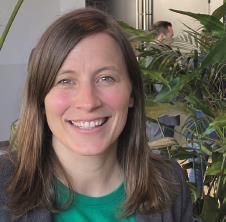

11. Geoff Tomlinson, MD, FSEW
Geoff Tomlinson leads forward-thinking FSEW, which launched the UK’s first commercial electric articulated 37-tonne HGV with customer Tesco in January 2022. Since transitioning its fleet, FSEW has drastically reduced emissions by taking 720,000 diesel miles off the road. Tomlinson is committed to replacing all diesel trucks and achieving net zero by 2025. The company is also creating a green energy hub to power its fleet with renewable energy, as well as having implemented an innovative carbon reporting software, enabling domestic and international clients to scrutinise the supply chains’ Scope Three emissions. Beyond electric alternatives, a significant portion of FSEW’s fleet has successfully transitioned to 100% renewable biomethane fuel, resulting in an impressive 85% reduction in CO2 emissions and up to 40% lifetime fuel cost savings compared with diesel.
12. Karen Geekie, project lead, Zero Emission Truck Taskforce, Transport Scotland
Karen Geekie has a key role to play in the decarbonisation of road freight across the nation. She led the development of the Scottish Zero Emission Truck Taskforce and steered the initiative to produce the forthcoming HGV Decarbonisation Pathway, launched in March. The Zero Emission Truck Taskforce brought together leading figures in logistics, manufacturing, energy and finance to shape the pathway to the decarbonisation of Scotland’s road freight and logistics sector.


13. Mark Collins, e-mobility and bodybuilder product manager, Volvo Trucks
Mark Collins is responsible for the portfolio of vehicles, which range from 16-tonne to 44-tonne and the future technology roadmap for the business, as well as providing engineering support to the network of companies that build on vehicles. He has been at the forefront of Volvo’s transition to EVs having been in his role for the duration of Volvo’s electric product launches, allowing him to develop extensive product knowledge and is the person to ask for electric-related questions. He works tirelessly with bodybuilders to promote electrical safety training and safe systems of work.
14. Ian Johnston, chairman, Charge UK
Ian Johnston, the CEO of Osprey Charging Network, is the inaugural chairman of Charge UK, the new trade association representing the UK’s EV charging industry. The association brings together 18 of the leading EV charge point installers that have pledged to invest more than £6bn in installing and operating EV charging infrastructure by 2030, doubling the size of the UK’s car and commercial vehicle charging network since 2023. When elected to the chairman’s post following Charge UK’s launch in April last year, Johnston said: “The formation of Charge UK is an exciting day and is a demonstration of the electric vehicle charging industry’s increasing size and importance to the UK economy. Together we are investing billions of pounds to get more charge points in the ground across the country. These numbers reinforce our commitment to the UK’s net-zero future.”


15. Tanya Neech, head of sustainability, Scania UK
Tanya Neech oversees the development and implementation of sustainability policies and goals for the company’s truck, bus, coach and power operations. She is also a board member of Zemo Partnership. Neech has more than 10 years of experience in the transport sector, working in various roles such as transport manager, driver trainer and coach operator. She holds a foundation certificate in environmental management from the Institute of Environmental Management and Assessment and a PCV licence. She is passionate about driving the shift to a more sustainable transport system.
16. Isabella Panovic, programme manager – zero-emission road freight, Innovate UK
Isabella Panovic is a programme manager at Innovate UK, facilitating the delivery of the government’s £200m Zero Emission HGV and Infrastructure Demonstrator programme. The programme aims to increase HGV operator confidence and government understanding of zero-emission HGV technology and infrastructure. Before joining the land and maritime transport team at Innovate UK, Panovic worked in research and development policy for a number of years in the UKRI research councils to support development of other net-zero technologies, such as offshore renewables and decarbonising heating and cooling. She also completed a PhD at the University of St Andrews, focussing on biorefineries and the chemistry of biomass.


17. Russell Fowler, grid connections and strategy manager, National Highways
In his previous role, Russell Fowler led National Grid’s transport decarbonisation pathway to support the government’s Net Zero 2050 ambition. He has been instrumental in engaging with industry customers and stakeholders to help shape National Grid’s strategy and regulatory delivery. Fowler has presented National Grid as a thought-leader and provided essential data to underpin the case for decarbonising the road transport sector, which is used by the government, vehicle manufacturers, infrastructure providers and operators to shape their pathways. He will continue with his infrastrucure decarbonisation support in his new role at National Highways.
18. Gloria Esposito, head of sustainability, Zemo Partnership
Gloria Esposito is an environmental scientist with expertise in policy development related to zero-emission vehicles and sustainable low-carbon fuels. She has established various initiatives to support the market deployment of sustainable low-carbon fuels, including Zemo’s Renewable Fuels Assurance Scheme. Esposito leads the Fuels Working Group and Zemo Partnership’s work stream on life-cycle analysis. Other work at Zemo has included a range of national policy areas including the Low Emission Bus Grant, the Clean Vehicle Retrofit Accreditation Scheme (CVRAS) and the Low Carbon Fuels Strategy. She has an MSc in integrated pollution control and is a chartered environmentalist and fellow member of IEMA.

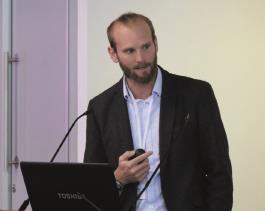
19. Rob King, co-founder and CEO, Zedify
Rob King has long been an advocate of urban freight decarbonisation, actively engaging with both the road transport sector and local authorities. With a background in running successful cargo bike operations, King and co-founder Sam Kean took things to the next level with the launch of Zedify in 2018. The business operates across nine UK cities, delivering thousands of zero-emission parcels every day for independent businesses and major parcels firms. King is passionate and vocal about the benefits of zero-emission urban deliveries and regularly takes part in industry working groups and events to share his knowledge.
20. Jawad Khursheed, CEO, HVS
Jawad Khursheed took over at the helm of HVS in 2020 and has guided the company through the challenging terrain of the pandemic while spearheading transformative vehicle development programmes. Under his leadership, HVS has secured substantial investments, expanded its intellectual property portfolio and unveiled its demonstrator vehicle. The group has emerged as the leading disruptor in the truck sector and is on course to put its first zero-emission HGVs on the road within the next two years.


21. Andrew Scott, product director, TVS Interfleet
In his role at TVS Interfleet, and during his time at Renault Trucks UK, Andrew Scott has driven the uptake of electric trucks and coordinated an industry response to barriers to wider EV adoption. This includes the development of the UK’s first electric concrete mixer. Scott has worked with stakeholders across the road transport sector to engage with the government on the issue of GVW and axle weights for EVs, which has been a key barrier to adoption from operators. He demonstrates leadership and enthusiasm for helping the wider industry switch to EVs.
22. Adam Bennett, EV and sustainability manager, DAF Trucks
As EV and sustainability manager at UK truck market leader DAF Trucks, Adam Bennett plays a key role influencing the industry in its future buying decisions. Bennett played a key role in the Battery Electric Truck trials (BETT), which took place between April 2022 and September 2023 and deployed 20 EVs in fleets across England. The outcome of these trials has given fleet operators important, practical guidance and advice on the deployment of battery EVs on regional distribution operations.


23. Philip Fjeld, CEO, CNG Fuels
Philip Fjeld heads up CNG Fuels, which develops, owns, and operates CNG refuelling infrastructure and sources 100% renewable biomethane (Bio- CNG) for its stations. The business aims to create a UK-wide network of public-access refuelling facilities to supply HGV operators, with 13 already in operation. Its Bio-CNG is 100% sourced from waste products and independently verified by the DfT’s Renewable Transport Fuel Obligation. Last year CNG Fuels acquired renewable biomethane supplier Renewable Transport Fuel Services and formed a holding company, ReFuels. This combines a rapidly growing UK network of refuelling stations with upstream biomethane sourcing activities to create one of Europe’s largest fully integrated renewable biomethane suppliers for freight transport.
24. James Venables, head of future sustainability, Mercedes-Benz Trucks UK
From the eCitan to the new eActros 600 4x2 truck with its claimed range of 500km, Mercedes-Benz has a full line-up of zero-emission commercial vehicles ready for operation, and James Venables is spearheading the introduction of electric trucks to UK operators. Mercedes-Benz Trucks UK not only provides locally emission-free and highly sustainable electric trucks, but also an entire eConsultancy service designed to accelerate the UK’s electrification journey. Responsible for all of Daimler Truck’s zero-emission products, plus overseeing infrastructure, lobbying, depot charging and the eConsultancy offer, Venables has a big job on his hands. He has demonstrated a strong proficiency in the realm of eMobility through his previous role as eConsultancy manager for the past 18 months.


25. Steve Gill, CEO, head of automotive, First Hydrogen
Steve Gill has more than 36 years’ experience in the automotive industry, specialising in powertrain technology and transport decarbonisation. As head of automotive at Canada-based First Hydrogen, Gill leads the development, the automotive strategy and the design and deployment of two ‘proof of concept’ demonstrator hydrogen fuel-cellpowered LCVs. This includes successful road trials with major UK operators including SSE, Wales and West Utilities and fleet management specialists Rivus. Gill was previously director, powertrain engineering, at Ford of Europe, having spent 19 years with Ford Motor Company in the UK, Germany and the US. There he led strategic programmes delivering innovative technology into volume production for Ford and its partners, including Jaguar Land Rover and the PSA Groupe. Technologies developed included Ford’s first series hybrid powertrain for commercial vehicles, Ford’s first mild hybrid technology for passenger cars and commercial vehicles and the multi-award winning 3-cylinder Ecoboost engine.
